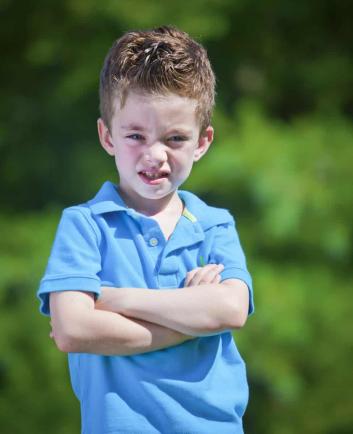
As parents, sometimes we turn a blind eye to our kids' shortcomings. Or we kid ourselves by twisting their less desirable personality traits into something positive. "Lola is so stubborn, but that means she'll always stick to her guns."� Or, "Matthew sure likes to argue; he'll make a great lawyer someday."�
Sometimes, though, we need a reality check. We're not doing our kids any favors by perpetuating bad behavior. Frankly, it's our job to correct our kids when they act like little punks.
We could be ruining our kids by,
1. Not giving them enough chores
From the time they're toddling around, we can teach our kids how to clean up their toys. As they grow, their responsibilities can increase. Making the bed, feeding the pet, and setting the table when our kids are little can evolve into mowing the lawn, scouring the tub, and washing the windows.
Owning responsibilities teaches kids that they are part of a working household. In a family, everyone does their part. This concept carries over into life: as citizens we follow rules, take care of our environment and help one another. In the workplace, we each perform unique duties and answer to the person in charge.
Having chores helps children recognize authority, and gain character and a solid work ethic.
2. Making all their decisions
My daughter often complains that I'm too strict. Many of her friends are given wide rein to choose their movies and skirt lengths while I like to have a say in those types of things.
While I'm not willing to bend on some issues, it hit me that I need to back off a bit. I need to allow my daughter to make more choices on the less important issues - ones unrelated to safety or modesty, for example. As a tween, she needs some room to figure things out on her own. She'll make mistakes, but that's fine because she will grow from those mistakes.
Kids need some autonomy. But it's up to us to determine which choices to turn over to them.
3. Letting them make all their decisions
On the other hand, parents and caregivers should draw boundaries and provide discipline.
It's often been said that kids crave structure and rules. They feel more secure in a setting with boundaries and expectations. Deciding to let your child or teen navigate his own way in the world by allowing too much freedom is poor parenting.
"No matter how often children act as if they want to be in control, having too much power is frightening. They intuitively know that they need an adult to be in charge, and they count on their parents to guide their behavior,"� says this article.
4. Not tracking their whereabouts
You wouldn't allow your toddler to wander off unsupervised in your neighborhood. Older children and teens, while they're better able to fend for themselves, still need perimeters. When kids aren't required to report their whereabouts, they may feel that their parents don't care about what they're doing, either.
Knowing who they are with and where puts our minds at ease and helps ensure that our kids aren't up to something shady. We can explain to our kids that their safety is our priority.
5. Not teaching them empathy
Kids are notoriously self-centered. They're usually wired that way, and caring for others is a learned trait.
When the focus is constantly on acquiring another Lego set, that cool new pair of shoes, or the latest iPhone, a sense of entitlement sets in. Children want to satisfy their cravings, and concern for others falls by the wayside.
One way to teach love and concern for others is through service. Whether it's serving meals at a homeless shelter or writing a letter to an elderly relative, learning about the plight of another person can be eye opening. Teaching our kids to unselfishly share their time and belongings can help them to find true joy.
No kid is perfect, and neither are parents. But we can help instill lifelong habits that will help our children become better people.

